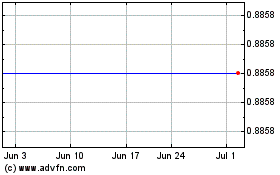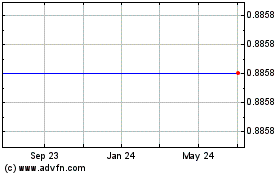SEC Probes Sale of Mozambique Debt -- WSJ
December 29 2016 - 3:02AM
Dow Jones News
By Matt Wirz and Julie Wernau
The U.S. Securities and Exchange Commission is investigating the
sale of $850 million in bonds issued by Mozambique, the latest
development in a scandal that is exposing the links between the
country, three international banks and a defense contractor.
The move inserts the U.S. into a widening global investigation
of Mozambique's debt deals, which involved undisclosed loans and
military purchases facilitated by the banks.
In 2013, Credit Suisse Group AG, Russian bank VTB Group and
France's BNP Paribas sold the bonds to investors for a Mozambican
state-owned company that said it needed money for tuna fishing. But
months later, Mozambique's government announced that the funds had
also been used to buy military equipment. Bondholders were also
unaware that Credit Suisse and VTB made $1.2 billion in undisclosed
bank loans to other state-owned companies for additional military
purchases until The Wall Street Journal reported on the deals in
April.
The SEC last month sent letters to bondholders asking them for
documents provided by Credit Suisse, VTB and BNP Paribas during the
sale of the bonds, according to a copy of the letter reviewed by
the Journal. The letter also requested investors turn over all
communications to and from the banks related to the bonds.
The SEC declined to comment.
British and Swiss regulators launched similar probes in the
summer. The International Monetary Fund and donor nations in April
suspended lending to the country after the Journal reported the
existence of the undisclosed bank loans.
Mozambican President Filipe Nyusi recently agreed to an
international audit of the deals by investigations firm Kroll, in
an effort to regain access to frozen international aid. A report of
the audit is expected in February, a person familiar with the
matter said.
Mozambique used proceeds from the bonds and loans to purchase
military and maritime goods and services from firms owned by
holding company Privinvest, such as French defense contractor
Constructions Mécaniques de Normandie. Privinvest is owned by
Lebanese businessman Iskandar Safa. At the time of the deal,
Mozambique's ruling party was in heightened conflict with
opposition forces.
About four years after issuing the bonds, Mozambique's coffers
are near empty and the country is requesting debt relief from
bondholders for the second time in nine months.
The SEC investigation heightens scrutiny on the back-to-back
restructuring attempts and on the accuracy of disclosures
Mozambique and its banks made to bond investors and others as the
debt deals slowly unraveled.
A committee of bondholders -- including mutual-fund managers
AllianceBernstein LP and Franklin Templeton Investments, and hedge
funds Greylock Capital Management, NWI Management and Pharo
Management -- formed in recent weeks to defend their interests.
The $1.2 billion in additional loans were made by Credit Suisse
and VTB to other companies owned by Mozambique's intelligence
service to fund other contracts with Mr. Safa's companies. BNP
helped sell the bonds but didn't arrange the undisclosed loans with
Credit Suisse and VTB, people familiar with the matter said.
Proceeds from at least some of the debt deals went straight from
the banks to Mr. Safa's companies, a person familiar with the
matter said. In typical government bond sales, the borrowing
country receives the proceeds, then uses them to pay contractors
itself. A spokesman for Privinvest, Mr. Safa's holding company,
said: "The funds flow and mechanics was agreed by and between the
banks and the customer."
Mozambique's economy slumped in 2015 as oil prices fell and in
March of this year, Credit Suisse and VTB asked bondholders to
agree to let the repayment of the debt be postponed. Most
bondholders agreed, but days later, the undisclosed loans became
public knowledge, infuriating investors and prompting international
donors to halt lending.
After agreeing to the international audit, Mozambique announced
to bondholders in late October that it needed to restructure their
debt again -- this time including the additional $1.2 billion in
bank loans -- but bondholders rebuffed the proposal.
Mozambique's advisers haven't spoken with bondholders for more
than a month but have been holding preliminary discussions with
Credit Suisse and VTB to lay the groundwork for future
negotiations, people familiar with the process said.
The SEC sent bondholders its letter a few weeks after Mozambique
proposed the second restructuring.
Write to Matt Wirz at matthieu.wirz@wsj.com and Julie Wernau at
Julie.Wernau@wsj.com
(END) Dow Jones Newswires
December 29, 2016 02:47 ET (07:47 GMT)
Copyright (c) 2016 Dow Jones & Company, Inc.
Credit Suisse (NYSE:CS)
Historical Stock Chart
From Mar 2024 to Apr 2024

Credit Suisse (NYSE:CS)
Historical Stock Chart
From Apr 2023 to Apr 2024
